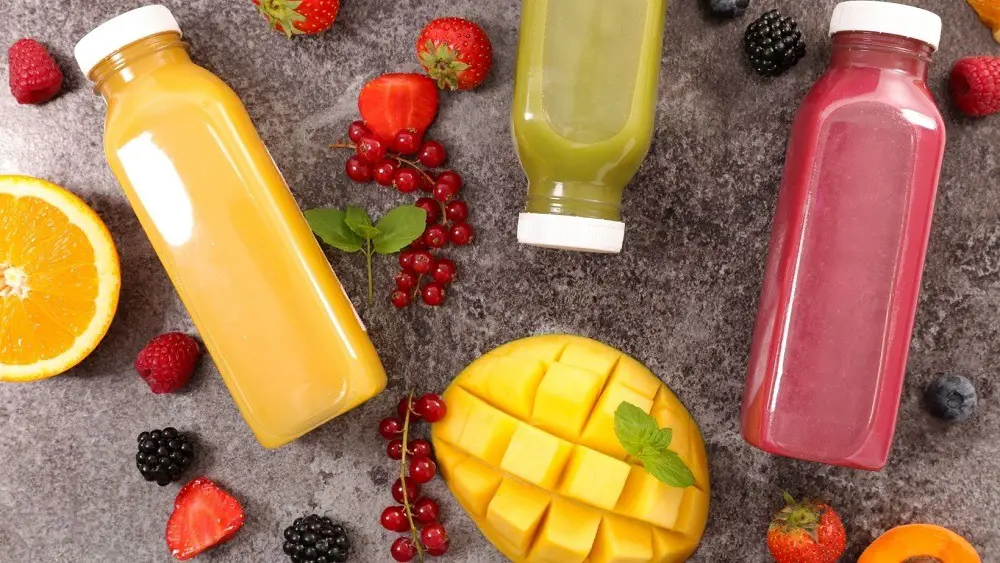Juice is a beverage enjoyed by many all around the world. Whether it’s for breakfast, as a refreshing drink midway through the day, or because you simply feel like taking your one a day of fruit in beverage form.
To many, juice is considered healthy. It’s made out of fruit and is full of nutrients, which contributes to a healthy diet, and there are many home remedies for fighting off colds and different health issues with the help of different types of juice, on the regular.

However, juice has become pretty controversial in recent years, as more and more people have started to realize that it contains high levels of sugar. So…not so healthy after all.
Fruit contains sugar anyways, but it’s a very low quantity. With juice, multiple pieces of fruit are used to fill a single glass, and sometimes more sugar is added in order for the juice to be sweeter and more addictive. So essentially, drinking a glass of orange juice means you are consuming a lot more sugar than if you were just eating the orange.
There are plenty of dietary experts that have spoken out about the correlation between high blood sugar and people that drink a lot of juice on the regular. Juice contains a lot of sugar, and if you really want to be healthy, you should just stick to eating the fruit by itself.
But…does this mean that you have to give up juice forever?
Luckily, no. There are plenty of juice options that are low in sugar, so that they provide plenty of the nutrients and vitamins, without being saturated in sugar. They are also referred to as healthy juices, and sometimes known as low glycemic index juices. Whichever way you call them, the fact is that they are healthier, and better for your diet!
Sugar in juice:
Okay, so juice has sugar. Apparently, a lot more than people are aware of, which is why juice isn’t quite as healthy as previously believed. But how much sugar do juices have exactly? And why is this sugar bad?
Let’s take a more in-depth look at all this!
Juice can be made in different ways and with different methods of preparation and preservation. However, all juices are usually highly concentrated amounts of juice extracted from fruits. It takes multiple pieces of fruit, but here is the problem: the juice takes most of the sugar and almost none of the fiber and nutritional contents.
In fact, many doctors recommend reducing the amount of juice that children consume, as it has almost no nutritional value, and it is very high in sugar. This can lead to many problems, such as high sugar levels in the blood, obesity, diabetes, dental decay, and many more. Overconsumption of juice is dangerous and bad for your health.
So you get an idea, the average amount of sugar contained in a single 250ml cup of 100% fruit juice, is around 24 grams. But adults should not have more than 30g of free sugars a day, so a single cup is already almost at the max! It’s even worse for children. Those aged between 7 and 10 should have a max of 24g of free sugar a day, and those aged between 4 and 6 should have a max of 19g a day.
A single cup of juice is already more than the maximum sugar young children are recommended, and children often drink several cups a day!
Why should you choose low-sugar juices?
Juices low in sugar are essentially juices that have been made to contain as little sugar as possible, in order to be healthier. Usually, they have no added sugar whatsoever. Apart from this, they might have blended fruit juice with water or used low-sugar ingredients, or might be made with a higher amount of vegetables than fruit. Juices that include vegetables, also known as green juices, are by far the healthiest as they have no sugar, except for what little piece of fruit is added to naturally sweeten the mix.
But why should you choose low-sugar juices?
Well, the main reason is for health, as overconsumption of sugar is bad. But let’s be more exact:
- Less sugar means fewer health risks:
Consuming too much sugar can lead to some serious health risks, including high sugar levels in your blood, diabetes, teeth decay, obesity, and many more. It’s especially dangerous in children, or in those with a predisposition to any of those health problems.
- Low-sugar juices mean more nutrients:
Most low-sugar juices are green juices, known to be healthy and full of fiber and nutrients. This means that they will add a lot more to your diet, and will provide many benefits other than not being high in sugar.
- Less addictive:
Have you ever wondered why fruit juice is so addictive and delicious? Ever found yourself craving it? It’s because of the sugar! Sugar is highly addictive, and that’s an added danger to the overconsumption of juices.
- The best low sugar juices:
The best low sugar juices are those that are not only low in sugar but also high in beneficial nutrients so that the juice is actually a useful addition to your diet. Here are our favorite top low-sugar juices:
- Cranberry juice
- Tomato juice
- Beet juice
- Apple juice (as long as it has no added sugars)
- Pomegranate juice
- Berry juices of different types
- Grapefruit juice (as long as it has no added sugars)
Basically, any vegetable green juice will usually be low in sugar and extremely healthy. It’s especially good to look out for blends of vegetables with fruit too so that you’re getting both without the addition of extra sugar.
